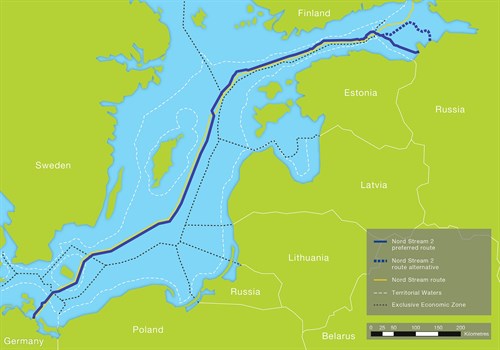Russian Nord Stream-2 on track with pipes expected soon

Photo courtesy of Nord Stream.
(Reuters) Pipes to build Moscow's Nord Stream-2 are expected December or January, a sign the gas project is going ahead, Ivan Shabalov, owner of Pipe Innovation Technologies (PIT), told the Reuters Russia Investment Summit.
The plan, designed to double the capacity of the existing pipeline on the bed of the Baltic Sea from Russia to Germany, has irked the EU, which is trying to cut the bloc's dependency on energy supplies from Moscow.
Russian natural gas supplies to Europe, where Kremlin-controlled Gazprom owns a 31% share of the market, have become increasingly politicized since 2014 when Moscow annexed Ukraine's Crimea region.
Although Shabalov's firm does not supply pipes for Nord Stream-2, one of his companies plans to provide cement coating for some of the pipes which are being used in the project and Gazprom is its customer.
Shabalov, who founded his firm in 2006 and heads the Russian pipemakers association, said he expected construction of Nord Stream-2, which was due to start in 2018, to go ahead as planned as production of the pipes had already begun.
"Supplies are seen starting in December-January," he told the Reuters Investment Summit at the Reuters office in Moscow.
Some 2.2 MM tons of steel pipes will be supplied by Europipe GmbH, a consortium which includes Salzgitter, with 40% of the contract and Russian companies OMK (33%) and Chelpipe (27%).
Last year Gazprom and its European partners, including E.ON, Wintershall, Shell, OMV and Engie, agreed on Nord Stream 2, which will double the 55 Bcmy of the existing pipeline.
Demand from Gazprom's domestic projects will fall to 1.2-1.3 MM tons of large-diameter pipes (LDP) this year - valuing them at $1.8 B - from a peak of more than 2 MM tons in 2015, Shabalov said.
Gazprom is seeking to bypass Ukraine, a key transit route for Russian gas to the EU and is also pushing on with the plans to build a gas pipeline to Turkey and beyond to Southern Europe.
The company also plans to complete the Power of Siberia pipeline to China in 2019-2020, part of Moscow's push for closer ties with Asia despite many analysts questioning its economics.
"When we built a pipeline to Germany in (the) 1970s, it was not profitable in some respects, this was pure political," Shabalov said.
"The return of projects like this is the beyond the 20 year horizon... The infrastructure project stands out as only the state can venture to build it."
Reporting by Svetlana Burmistrova; Additional reporting by Polina Devitt, Katya Golubkova, Christian Lowe, Jack Stubbs, Denis Pinchuk, Nastya Lyrchikova and Oksana Kobzeva; Writing by Vladimir Soldatkin; Editing by Alexander Smith

- Freeport LNG export plant in Texas reports shutdown of liquefaction train
- TotalEnergies and Mozambique announce the full restart of the $20-B Mozambique LNG project
- RWE strengthens partnerships with ADNOC and Masdar to enhance energy security in Germany and Europe
- Five energy market trends to track in 2026, the year of the glut
- Venture Global wins LNG arbitration case brought by Spain's Repsol



Comments